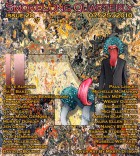The baby was hideous. I don’t know how to begin to describe how ugly this baby was. It deserved its own charity or telethon. In certain parts of the world, they’d drown it like a kitten the second it slopped out of the womb. The spawn of witchcraft or a deal with the devil.
The baby had squinty black eyes and a wide mouth like a basking shark. If its lopsided skull were an egg, someone at the egg factory would yell “Wrong!” and throw it down a chute. The nose was completely fucked, a gnarled parsnip of a thing.
Thank Christ the baby wasn’t real. He came out of one of those machines in the mall. My wife Gretchen and I squeezed together in the curtained booth and a flash went off. A minute later out came a picture of what our baby might look like. Our hypothetical baby.
Gretchen made a face like she’d just caught a whiff of something foul. I retched and clutched my throat like I was choking.
This was not what we were expecting because we were both reasonably photogenic people. Maybe the machine was broken. I looked for a manager or a complaint box, but there was neither.
For kicks, we named him Little Baby Boris.
At home Gretchen hung the picture of Boris on the refrigerator. Over my wife’s shoulder, as I ate my dinner, I could see the monstrous face gawk across the room. With their faces side by side, there was a resemblance. Small, but unmistakable. The slight bulge of forehead, how the eyes were spaced apart. I tried to shake the thought out of my head, because I knew if I didn’t it would wedge there like a splinter.
I got up, snatched the picture down, tossed it in the junk drawer. Then I sat across from Gretchen again.
“It was ruining my appetite,” I explained.
Gretchen pinched her lips and wrinkled her brow and tucked her chin into her chest. Her eyes got wet and quaky. I knew this look. I’d seen it many times before. Maybe the mood would blow over if I didn’t acknowledge it.
But then she asked, “What if he was ours?”
“Gretchen,” I said.
“I would still love him.”
I said nothing.
“It’s biological,” she said. “You would too.”
“Maybe.” I shrugged.
Gretchen fell silent and sipped her wine. I figured that was enough of that. Still, I found myself wondering what would happen to someone like Boris. No doubt his life would be fraught with heartbreak. I pictured a child with butter-colored hair, a duckish waddle, a pear-like body. As an adult, he’d never know the touch of a woman unless an exchange of currency were involved. There would be long years of hardship and depression, a trail of bad checks and eviction notices. He’d develop a sweet tooth for violent pornography, the black-market German type with guys in black cloaks wielding cudgels. One thing would lead to another and he’d careen into a life of crime, entangled in some moon-worshiping cult. I pictured how such a life might end. This is what I came up with: Boris in an assassination attempt on the President, rifle clutched in hand, shot down dead from a Texas clock tower.
So I was thinking when Gretchen got on the subject of whether I’d still want a baby if we knew there was something wrong with it. Clubbed feet, a malformed heart, some kind of syndrome, whatever. I said it would be a bad idea, even cruel, to let any child into the world with that kind of disadvantage.
“What if somebody rang the doorbell in the middle of the night and left him on our porch?” Gretchen said.
“Like, in a little bassinet?”
Gretchen nodded.
“That only happens in movies,” I said. “Bad movies.”
“But what if?”
“I’d call the police.”
“The police stations and all the orphanages or whatever are closed. Hypothetically.”
I would hypothetically shit in my pants, I thought, but knew better than to say. “I would leave him on someone else’s doorstep.”
“That’s horrible,” she said.
After dinner she was rough with the plates, clattering them back into the cupboard. I scootched up from behind and clutched her hips, buried my nose in her hair. She went stiff and I let go. I started to say we were making a big deal out of a dumb picture. A dumb picture of a dumb kid that didn’t exist.
“Don’t,” she said, and there was something sharp in her voice that made me flinch.
Hands in the air, I backed off.
She poured another glass of wine and padded down the darkened hall toward the bedroom. Then she turned around. She came back to the kitchen and rummaged through the junk drawer. She took out the picture of Boris and hung it back on the refrigerator.
I sat at the kitchen table with another glass of wine and stared at the photograph. Boris stared back. I searched for some resemblance between us, but could see nothing. I was thankful.
That was years ago and I burned the photo over the stove after Gretchen left. I don’t know where she is now, if she’s with another man, or what. Funny, I’m starting to forget her face, even after being married all that time. But I remember Boris’s, and when I think of it, a dark flavor fills my mouth. Anger twists through me. So help me, if he were here, I’m afraid I might grab his arms and shake him until that ugly little head snapped off.



 The core workshop of SmokeLong Fitness is all in writing, so you can take part from anywhere at anytime. We are excited about creating a supportive, consistent and structured environment for flash writers to work on their craft in a community. We are thrilled and proud to say that our workshop participants have won, placed, or been listed in every major flash competition. Community works.
The core workshop of SmokeLong Fitness is all in writing, so you can take part from anywhere at anytime. We are excited about creating a supportive, consistent and structured environment for flash writers to work on their craft in a community. We are thrilled and proud to say that our workshop participants have won, placed, or been listed in every major flash competition. Community works.